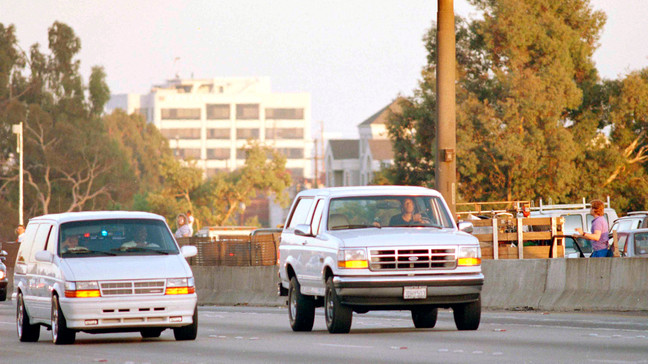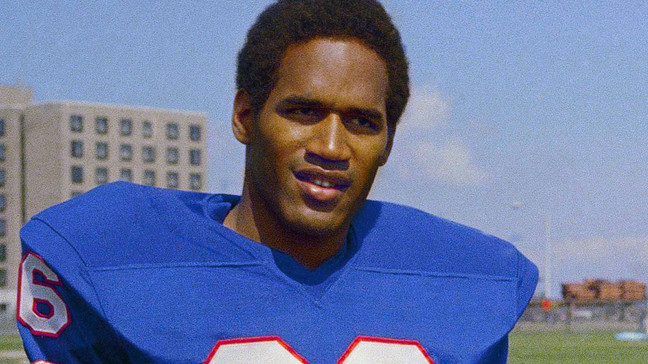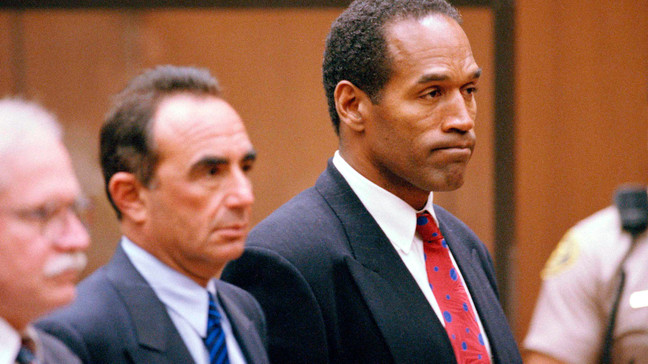How the OJ Simpson case captivated the country and changed the media landscape
SYRACUSE, N.Y. (WSTM) — The chase, trial and subsequent verdict in the O.J. Simpson case captivated the country in the mid-90s. Nearly 30 years later, Simpson died Thursday at the age of 76.
{sd-embed class="sd-embedded-media" data-alt="WTVH" data-caption="How%20the%20OJ%20Simpson%20case%20captivated%20the%20country%20and%20changed%20the%20media%20landscape%20(WSTM)" data-duration="152.064" data-externalid="9830000c2ad449a69265721c6e071e59" data-mediatype="video" data-renditions="" data-thumburl="/resources/media/a28fc13b-cd38-40d2-86c0-341afcf68944-medium16x9_AP24102535909452.jpg" data-title="How%20the%20OJ%20Simpson%20case%20captivated%20the%20country%20and%20changed%20the%20media%20landscape" data-url="https://sinclair-vod-assets.sinclairstoryline.com/9830000c2ad449a69265721c6e071e59/hls/index.m3u8" data-defaultthumb="" data-embed-file="%3Cdiv%20class=%22sda-VideoEmbed%22%3E%0A%20%20%20%20%20%20%20%20%20%20%20%20%3Cdiv%20class=%22sda-video-media%22%3E%0A%20%20%20%20%20%20%20%20%20%20%20%20%3Ciframe%0A%20%20%20%20%20%20%20%20%20%20%20%20%20%20%20%20width=%22560%22%0A%20%20%20%20%20%20%20%20%20%20%20%20%20%20%20%20height=%22315%22%0A%20%20%20%20%20%20%20%20%20%20%20%20%20%20%20%20class=%22sda-embeded-player-iframe%20sda-VideoEmbed-iframe%22%0A%20%20%20%20%20%20%20%20%20%20%20%20%20%20%20%20src=%22/resources/embeds/vod.html?externalId=9830000c2ad449a69265721c6e071e59%22%0A%20%20%20%20%20%20%20%20%20%20%20%20%20%20%20%20frameborder=%22no%22%3E%0A%20%20%20%20%20%20%20%20%20%20%20%20%3C/iframe%3E%0A%20%20%20%20%20%20%20%20%20%20%20%20%0A%20%20%20%20%20%20%20%20%3C/div%3E%0A%20%20%20%20%20%20%20%20%20%20%20%20%3Cdiv%20class=%22sda-video-info%22%3E%0A%20%20%20%20%20%20%20%20%20%20%20%20%3Cimg%20class=%22sda-VideoEmbed-stopImage%22%20src=%22/resources/media/a28fc13b-cd38-40d2-86c0-341afcf68944-medium16x9_AP24102535909452.jpg%22/%3E%0A%20%20%20%20%20%20%20%20%20%20%20%20%3Cdiv%20class=%22sda-VideoEmbed-caption%22%3E%0A%20%20%20%20%20%20%20%20%20%20%20%20%20%20%20%20%20%20%20%20%3Cspan%3ECaption:%20How%20the%20OJ%20Simpson%20case%20captivated%20the%20country%20and%20changed%20the%20media%20landscape%20(WSTM)%3C/span%3E%0A%20%20%20%20%20%20%20%20%20%20%20%20%20%20%20%20%3C/div%3E%0A%20%20%20%20%20%20%20%20%3C/div%3E%0A%20%20%20%20%20%20%20%20%3C/div%3E" data-embed-type="video" contenteditable="false"}{/sd-embed}
As many look back on his life, it brings back memories of one of the country's most salacious criminal trials.
On June 17, 1994, it seemed like just about everyone was glued to their TV. Los Angeles had seen plenty of high-speed police chases before, but nothing quite like the pursuit of Simpson in the now-infamous white Ford Bronco.
Everybody who was around also remembers when that Bronco chase story started breaking," said Robert Thompson, professor of television and popular culture at Syracuse University's Newhouse School.
{sd-embed class="sd-embedded-media" data-alt="AP24102654688551.jpg" data-caption="FILE%20-%20Al%20Cowlings,%20with%20O.J.%20Simpson%20hiding,%20drives%20a%20white%20Ford%20Bronco%20as%20they%20lead%20police%20on%20a%20two-county%20chase%20along%20the%20northbound%20405%20Freeway%20towards%20Simpson's%20home,%20June%2017,%201994,%20in%20Los%20Angeles.%20(AP%20Photo/Lois%20Bernstein,%20File)" data-duration="" data-externalid="11ef5822-d01f-4a3a-9610-c5fe045d023a" data-mediatype="image" data-renditions="%7B%22large16x9%22:%7B%22blurSigma%22:-1,%22height%22:1759,%22label%22:%22large16x9%22,%22scaleWidth%22:986,%22url%22:%22/resources/media/11ef5822-d01f-4a3a-9610-c5fe045d023a-large16x9_AP24102654688551.jpg%22,%22width%22:3128,%22x%22:0,%22y%22:163,%22uuid%22:null,%22id%22:%22a9495b5e-d4a7-4340-b5c9-a35040bc3ee6%22,%22preciseWidth%22:null,%22preciseHeight%22:null,%22name%22:%22large16x9Url%22,%22rendition%22:%22large16x9%22,%22labelOrConvertedName%22:%22large16x9%22%7D,%22jumbo16x9%22:%7B%22blurSigma%22:-1,%22height%22:1759,%22label%22:%22jumbo16x9%22,%22scaleWidth%22:1320,%22url%22:%22/resources/media/11ef5822-d01f-4a3a-9610-c5fe045d023a-jumbo16x9_AP24102654688551.jpg%22,%22width%22:3128,%22x%22:0,%22y%22:163,%22uuid%22:null,%22id%22:%2204cf25d7-a167-4e0e-ab5e-a887dd988749%22,%22preciseWidth%22:null,%22preciseHeight%22:null,%22name%22:%22jumbo16x9Url%22,%22rendition%22:%22jumbo16x9%22,%22labelOrConvertedName%22:%22jumbo16x9%22%7D,%22small16x9%22:%7B%22blurSigma%22:-1,%22height%22:1759,%22label%22:%22small16x9%22,%22scaleWidth%22:160,%22url%22:%22/resources/media/11ef5822-d01f-4a3a-9610-c5fe045d023a-small16x9_AP24102654688551.jpg%22,%22width%22:3128,%22x%22:0,%22y%22:163,%22uuid%22:null,%22id%22:%22908e4454-814e-42d4-882d-e0602d907ab4%22,%22preciseWidth%22:null,%22preciseHeight%22:null,%22name%22:%22small16x9Url%22,%22rendition%22:%22small16x9%22,%22labelOrConvertedName%22:%22small16x9%22%7D,%22full16x9%22:%7B%22blurSigma%22:-1,%22height%22:1759,%22label%22:%22full16x9%22,%22scaleWidth%22:3128,%22url%22:%22/resources/media/11ef5822-d01f-4a3a-9610-c5fe045d023a-full16x9_AP24102654688551.jpg%22,%22width%22:3128,%22x%22:0,%22y%22:163,%22uuid%22:null,%22id%22:%22063e3dcd-181c-4125-8138-8e0e86fbee13%22,%22preciseWidth%22:null,%22preciseHeight%22:null,%22name%22:%22full16x9Url%22,%22rendition%22:%22full16x9%22,%22labelOrConvertedName%22:%22full16x9%22%7D,%22medium16x9%22:%7B%22blurSigma%22:-1,%22height%22:1759,%22label%22:%22medium16x9%22,%22scaleWidth%22:648,%22url%22:%22/resources/media/11ef5822-d01f-4a3a-9610-c5fe045d023a-medium16x9_AP24102654688551.jpg%22,%22width%22:3128,%22x%22:0,%22y%22:163,%22uuid%22:null,%22id%22:%22bf12c230-7df2-4c12-96e1-1f23ab85b5d9%22,%22preciseWidth%22:null,%22preciseHeight%22:null,%22name%22:%22medium16x9Url%22,%22rendition%22:%22medium16x9%22,%22labelOrConvertedName%22:%22medium16x9%22%7D%7D" data-thumburl="/resources/media/11ef5822-d01f-4a3a-9610-c5fe045d023a-medium16x9_AP24102654688551.jpg" data-title="How%20the%20OJ%20Simpson%20case%20captivated%20the%20country%20and%20changed%20the%20media%20landscape" data-url="" data-defaultthumb="true" data-embed-file="%0A%20%20%20%20%3Cdiv%20class=%22sda-ImageEmbed%22%3E%0A%20%20%20%20%20%20%20%20%3Cimg%20src=%22/resources/media/11ef5822-d01f-4a3a-9610-c5fe045d023a-medium16x9_AP24102654688551.jpg%22%20alt=%22%22%20/%3E%0A%20%20%20%20%20%20%20%20%3Cdiv%20class=%22sda-ImageEmbed-caption%22%3EFILE%20-%20Al%20Cowlings,%20with%20O.J.%20Simpson%20hiding,%20drives%20a%20white%20Ford%20Bronco%20as%20they%20lead%20police%20on%20a%20two-county%20chase%20along%20the%20northbound%20405%20Freeway%20towards%20Simpson's%20home,%20June%2017,%201994,%20in%20Los%20Angeles.%20(AP%20Photo/Lois%20Bernstein,%20File)%3C/div%3E%0A%20%20%20%20%3C/div%3E" data-embed-type="image" contenteditable="false"}{/sd-embed}
Thompson remembers it all well. He was among those watching when Simpson, the former NFL football star, led more than a dozen police cars in pursuit.
"I think there was a sense that this had an educating factor to it even though it was sensationalized and tabloid," he said. "Our consciousness were raised through the course of that trial."
Simpson was subsequently charged with the murders of his former wife, Nicole Brown Simpson, and her friend, Ronald Goldman.
An estimated 150 million people stopped what they were doing on Oct. 3, 1995, to witness the verdict in the double murder case. It was a case that forever changed the media landscape.
Thompson's history of television class was studying the chase this week and Simpson's subsequent trial. He remembers the wall-to-wall coverage, something that had rarely been done before.
{sd-embed class="sd-embedded-media" data-alt="AP24102535907666.jpg" data-caption="FILE%20-%20O.J.%20Simpson%20stands%20as%20he%20listens%20to%20Municipal%20Judge%20Kathleen%20Kennedy-Powell%20as%20she%20reads%20her%20decision%20to%20hold%20him%20over%20for%20trial%20on%20July%208,%201994,%20in%20connection%20with%20the%20June%2012%20slayings%20of%20his%20ex-wife%20Nicole%20Brown%20Simpson%20and%20Ronald%20Goldman.%7B%7D%20(AP%20Photo/Eric%20Draper,%20Pool,%20File)" data-duration="" data-externalid="c05cbdad-a841-46db-8295-5b8ccf314577" data-mediatype="image" data-renditions="%7B%22large16x9%22:%7B%22blurSigma%22:-1,%22height%22:1873,%22label%22:%22large16x9%22,%22scaleWidth%22:986,%22url%22:%22/resources/media/c05cbdad-a841-46db-8295-5b8ccf314577-large16x9_AP24102535907666.jpg%22,%22width%22:3330,%22x%22:0,%22y%22:234,%22uuid%22:null,%22id%22:%223d4ffe85-2cd1-4104-96ac-b9a93d2fb9d5%22,%22preciseWidth%22:null,%22preciseHeight%22:null,%22name%22:%22large16x9Url%22,%22rendition%22:%22large16x9%22,%22labelOrConvertedName%22:%22large16x9%22%7D,%22jumbo16x9%22:%7B%22blurSigma%22:-1,%22height%22:1873,%22label%22:%22jumbo16x9%22,%22scaleWidth%22:1320,%22url%22:%22/resources/media/c05cbdad-a841-46db-8295-5b8ccf314577-jumbo16x9_AP24102535907666.jpg%22,%22width%22:3330,%22x%22:0,%22y%22:234,%22uuid%22:null,%22id%22:%220982ac87-ec07-44a1-a30c-ff143b9d4db6%22,%22preciseWidth%22:null,%22preciseHeight%22:null,%22name%22:%22jumbo16x9Url%22,%22rendition%22:%22jumbo16x9%22,%22labelOrConvertedName%22:%22jumbo16x9%22%7D,%22small16x9%22:%7B%22blurSigma%22:-1,%22height%22:1873,%22label%22:%22small16x9%22,%22scaleWidth%22:160,%22url%22:%22/resources/media/c05cbdad-a841-46db-8295-5b8ccf314577-small16x9_AP24102535907666.jpg%22,%22width%22:3330,%22x%22:0,%22y%22:234,%22uuid%22:null,%22id%22:%22ce078c25-333b-4908-941f-4cc41055296b%22,%22preciseWidth%22:null,%22preciseHeight%22:null,%22name%22:%22small16x9Url%22,%22rendition%22:%22small16x9%22,%22labelOrConvertedName%22:%22small16x9%22%7D,%22full16x9%22:%7B%22blurSigma%22:-1,%22height%22:1873,%22label%22:%22full16x9%22,%22scaleWidth%22:3330,%22url%22:%22/resources/media/c05cbdad-a841-46db-8295-5b8ccf314577-full16x9_AP24102535907666.jpg%22,%22width%22:3330,%22x%22:0,%22y%22:234,%22uuid%22:null,%22id%22:%22ce7f434b-0d56-4940-8a8b-b35ac298c9ae%22,%22preciseWidth%22:null,%22preciseHeight%22:null,%22name%22:%22full16x9Url%22,%22rendition%22:%22full16x9%22,%22labelOrConvertedName%22:%22full16x9%22%7D,%22medium16x9%22:%7B%22blurSigma%22:-1,%22height%22:1873,%22label%22:%22medium16x9%22,%22scaleWidth%22:648,%22url%22:%22/resources/media/c05cbdad-a841-46db-8295-5b8ccf314577-medium16x9_AP24102535907666.jpg%22,%22width%22:3330,%22x%22:0,%22y%22:234,%22uuid%22:null,%22id%22:%220c402c46-a6f1-485c-a7fe-3db336f3f90b%22,%22preciseWidth%22:null,%22preciseHeight%22:null,%22name%22:%22medium16x9Url%22,%22rendition%22:%22medium16x9%22,%22labelOrConvertedName%22:%22medium16x9%22%7D%7D" data-thumburl="/resources/media/c05cbdad-a841-46db-8295-5b8ccf314577-medium16x9_AP24102535907666.jpg" data-title="How%20the%20OJ%20Simpson%20case%20captivated%20the%20country%20and%20changed%20the%20media%20landscape" data-url="" data-defaultthumb="true" data-embed-file="%0A%20%20%20%20%3Cdiv%20class=%22sda-ImageEmbed%22%3E%0A%20%20%20%20%20%20%20%20%3Cimg%20src=%22/resources/media/c05cbdad-a841-46db-8295-5b8ccf314577-medium16x9_AP24102535907666.jpg%22%20alt=%22%22%20/%3E%0A%20%20%20%20%20%20%20%20%3Cdiv%20class=%22sda-ImageEmbed-caption%22%3EFILE%20-%20O.J.%20Simpson%20stands%20as%20he%20listens%20to%20Municipal%20Judge%20Kathleen%20Kennedy-Powell%20as%20she%20reads%20her%20decision%20to%20hold%20him%20over%20for%20trial%20on%20July%208,%201994,%20in%20connection%20with%20the%20June%2012%20slayings%20of%20his%20ex-wife%20Nicole%20Brown%20Simpson%20and%20Ronald%20Goldman.%20(AP%20Photo/Eric%20Draper,%20Pool,%20File)%3C/div%3E%0A%20%20%20%20%3C/div%3E" data-embed-type="image" contenteditable="false" }<="" sd-embed="">{/sd-embed}
"I think the extensive coverage of this trial was feeding an appetite that was already there," Thompson said. "I think people would have watched this kind of thing if there had been opportunities to watch it in trials in the 19th century before there was any of this media to cover it."
Thompson points to other historical events that have brought people together since the Simpson trial including the Columbine school massacre, the 9/11 terror attacks and even the trial of Casey Anthony.
He expects the public to continue to crave coverage of the next big event.
"Now whether you watch it on your phone or whatever other device, the idea of watching the theatricality of a major trial I think is going to always generate interest because we are humans," he said.




